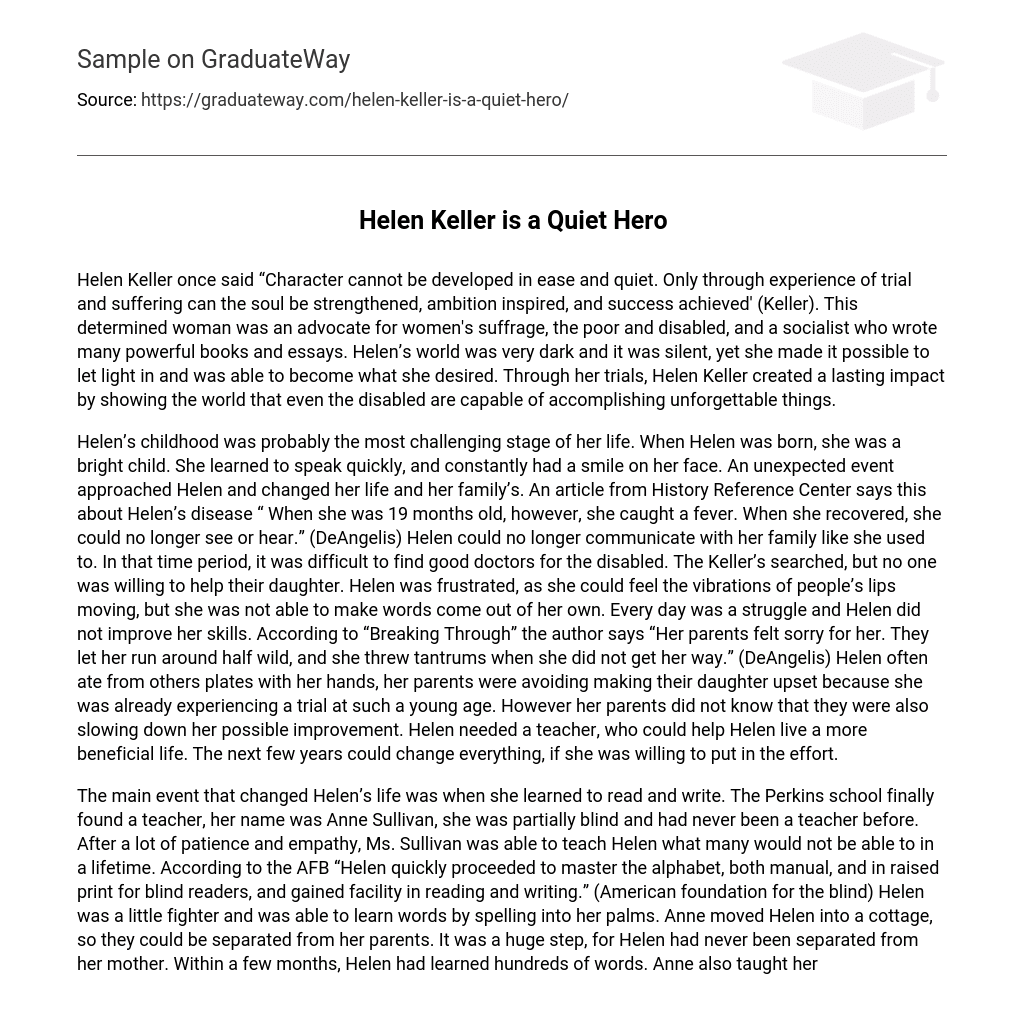Helen Keller famously believed that character development is not possible in a life of comfort and tranquility. She emphasized the importance of going through trials and suffering to strengthen the soul, ignite ambition, and attain success (Keller). Despite living in a world devoid of light and sound, Helen Keller defied expectations and found brightness in her existence. She advocated for women’s suffrage, championed causes for the impoverished and disabled, and authored impactful books as well as essays. Helen Keller’s narrative stands as proof that individuals with disabilities have the potential to accomplish extraordinary feats.
Helen’s early years were the most difficult phase she encountered. Initially, Helen was a brilliant child who quickly learned to speak and wore a constant smile. However, her life took an unexpected turn when she fell ill as stated in an article from the History Reference Center, which reads, “When she was 19 months old, however, she caught a fever. When she recovered, she could no longer see or hear.” (DeAngelis) Due to this illness, Helen’s ability to communicate with her family drastically diminished. During that period, it was challenging for disabled individuals to find competent medical practitioners. Despite searching extensively, the Keller family struggled to find help for their daughter. The inability to communicate effectively left Helen frustrated. Although she could feel the vibrations of people’s lips moving, she couldn’t voice her own words. Each day became a struggle for Helen as her skills failed to improve. According to “Breaking Through,” the author states, “Her parents felt sorry for her. They let her run around half wild and she threw tantrums when she did not get her way.” (DeAngelis) Helen often ate using her hands from others’ plates, and her parents avoided upsetting her further since she was already facing a major hardship at such a young age. Unfortunately, they were unaware that their actions were hindering her potential progress. Helen urgently needed a teacher who could assist her in leading a more constructive life. The forthcoming years held the potential to change everything for Helen, provided she was willing to put in the necessary effort.
Helen’s life underwent a significant transformation when she acquired the ability to read and write. The Perkins school enlisted Anne Sullivan, a partially blind teacher with no prior teaching experience, to help Helen. With great patience and empathy, Ms. Sullivan accomplished what many believed was an impossible feat. The American Foundation for the Blind (AFB) states that Helen quickly mastered both manual and raised print alphabets for blind readers, excelling in reading and writing.
To facilitate her education further, Helen moved into a separate cottage with Anne, separating herself from her parents for the first time. In a matter of months, she learned hundreds of words. Anne also taught her braille, enabling Helen to study from school textbooks. Thanks to her newfound education, Helen became just like any other student and went on to pursue higher education at Radcliffe College.
In 1900, Helen entered Radcliffe College and graduated cum laude in 1904, becoming the first deaf and blind person to earn a bachelor of arts degree according to the AFB. Through her remarkable journey, Helen Keller demonstrated her unwavering resilience and determination.
Having achieved her goal of communication, Helen was now able to carry on with her life. She aspired to use her experiences to assist others in overcoming their own challenges.
Helen Keller was determined to make a lasting impact and improve society. The death of her teacher, Anne Sullivan, in 1934 deeply saddened her. Despite losing her teacher and best friend of over 50 years, Helen was determined to continue their legacy. In the article “Speaking out,” Quicke mentions that what is remarkable about Helen is not how her personality was shaped, but rather how she managed to build a public life and even have a political career despite her fragile emotional foundation (Quicke 171). Helen embraced socialism and found her own voice. She spoke at conferences about antiwar sentiments and preparedness before the outbreak of World War I. Her speeches resonated with people and she became a great influence on society. According to “Helen Keller and the Empire of the Normal,” her autobiography enjoyed widespread acclaim and success due to its uplifting tone and inspirational message (Tourville). Helen’s story touched the world and gave people hope that if she could achieve success, so could they. She wrote 475 speeches and essays centered around triumph over adversity. Despite her limited sensory abilities, Helen expressed her emotions remarkably well. Today, we can see Helen’s impact on the world as she taught society that with persistence and hard work, anything can be accomplished.
By demonstrating that even the disabled can make a difference, Helen Keller, a woman of great faith without sight and hearing, was able to conquer the world. She created a lasting impact through her trials, making her life more challenging to improve the lives of others. Today, thanks to Helen Keller’s example, the blind can communicate through reading braille and the deaf can communicate through sign language. Her legacy is one of triumphing over adversity, an attribute that society should strive to acquire.





